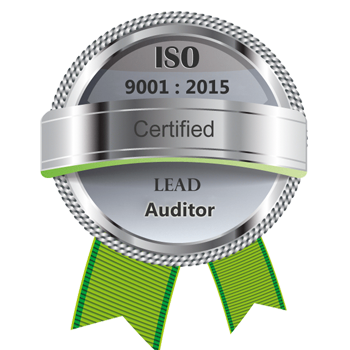Internal auditors and Lead auditors for ISO 9001

Lead Auditor Course:
1. Advanced ISO 9001 Knowledge: A deeper understanding of the ISO 9001 standard is provided, including its interpretation, implementation challenges, and best practices.
2. Audit Leadership and Management: Lead auditors need strong leadership and management skills. Topics include team management, conflict resolution, and decision-making.
3. Audit Planning and Preparation: Lead auditors are responsible for planning and leading audits effectively. This includes developing audit schedules, allocating resources, and ensuring audit readiness.
4. Audit Execution and Reporting: Lead auditors learn how to lead audit teams, manage audit activities, and oversee the audit process from start to finish. They also develop skills in reporting audit findings concisely and accurately.
5. Managing Non-Conformities: Lead auditors are expected to handle complex non-conformities effectively. They learn advanced techniques for identifying root causes, implementing corrective actions, and preventing recurrence.
6. Communication and Stakeholder Management: Effective communication is crucial for lead auditors. They learn how to communicate with auditees, clients, and certification bodies professionally and diplomatically.
7. Ethics and Professionalism: Lead auditors must adhere to high ethical standards and maintain professionalism throughout the audit process. This includes understanding auditor ethics, conflicts of interest, and confidentiality requirements.
ISO 9001 is a globally recognized
standard for quality management systems (QMS) developed by the International
Organization for Standardization (ISO). The standard outlines principles for
organizations to ensure they meet customer requirements and continually improve
their processes. Within ISO 9001, there isn't a specific course titled
"Internal & Lead Auditor Course," but there are courses designed
to train individuals as internal auditors and lead auditors for ISO 9001.
Internal Auditor Course:
1. Understanding ISO 9001: Participants learn about the
requirements and structure of the ISO 9001 standard. This includes
understanding its clauses, key terms, and the overall purpose of a quality
management system.
2. Audit Fundamentals: Basic principles of auditing are covered,
including the audit process, types of audits, and the role of auditors.
3. Audit Planning: How to plan and prepare for an internal audit,
including defining audit objectives, selecting audit criteria, and assembling
an audit team.
4. Conducting Audits: Techniques for conducting effective audits
are taught, such as interviewing, observation, and documentation review.
Participants learn how to gather evidence and assess conformity.
5. Reporting and Communication: Participants learn how to report
audit findings accurately and effectively. This includes writing non-conformity
reports and communicating audit results to relevant stakeholders.
6. Corrective Actions and Follow-Up: Understanding the corrective
action process is crucial. Participants learn how to identify non-conformities,
recommend corrective actions, and verify the effectiveness of corrective
measures.
7. Continuous Improvement: The course emphasizes the importance of
continuous improvement in a quality management system. Participants learn how
internal audits contribute to this process.
Both courses typically include practical exercises, case studies, and assessments to reinforce learning. Upon successful completion, participants may receive a certificate or qualification recognized by relevant accreditation bodies.

